At this point in the semester, when we’re slogging through stacks of papers and projects, it’s easy to lose sight of the purpose of grading. It’s not, in fact, to make ourselves and our students suffer. Our students’ final work should provide evidence of the learning they’ve done with us this fall. Students who have mastered the material at the appropriate level should do well.
Our top two concerns right now are keeping our grading aligned with the course goals and using our time efficiently. A good rubric or set of specifications helps on both counts. In order to develop such tools, we need a clear sense of what students should know or be able to do, and our priorities for their learning. What was the instructional purpose of the assignment? What is the exam meant to measure? There’s no need to comment on, or give weight to, issues that are not explicitly part of the goals. Since students can no longer revise, and many don’t review our comments on their final projects, now is not the best time to expend hours and energy crafting the sort of careful facilitative feedback that guides learning. Students need such feedback earlier in the semester, when they can use it to improve—now, at the end, what they need is transparency in our evaluation of their performance.
It’s always disappointing if the work our students submit doesn’t show the evidence of learning and accomplishment we were expecting. Sometimes that means our assessments weren’t well-aligned measures of their learning. It might be that students don’t have great metacognitive strategies, or they pulled too many all-nighters cramming for finals. This semester was exceptionally challenging, so it won’t be surprising if, across the board, their performance is a little lower than usual.
If you’re finding yourself tempted to grade on a forced curve, or besieged by last-minute requests for extra credit, it’s important to calibrate your response so that final grades reflect, as far as possible, how much students have learned. If students have mastered the material, but earned very poor grades, you may need to adjust your grading scale. Conversely, if high grades don’t seem to align with the level of mastery you’d like to see, you’ll also probably want to redesign your grading structure, exams, or assignments in the future.
If you’d like to discuss grading final projects or how to respond to end-of-semester grading questions or requests from students, we’re here to help! The Center is open for consultations throughout finals week and even after grades are posted.
Upcoming Events…
Spring Course Design Workshop
Wednesday, Dec. 19th, 10:00-4:00. Lunch provided.
If you’d like a friendly forum to reflect on how your fall courses went, and to make plans for spring, please join us after grades are in. Whether you’re revising a course or planning a new prep, we can support you as you use recent research on learning to shape your spring courses. Although many of us are accustomed to planning our courses in isolation, the important work of teaching is better tackled in a community of peers, with plenty of opportunities for feedback and fresh ideas. This will be a practical, hands-on workshop, so you’ll leave having developed course plans and materials. We look forward to working with you. Please RSVP here.
Spring Faculty Reading Groups
Faculty reading groups give you an opportunity to connect with colleagues from across the university, delve into the research on learning, and share practical strategies for making your classes even more effective. Each group will involve a series of three meetings, so please check your calendar to make sure you can attend. Space is limited. RSVP here and we’ll send you your complimentary copy of the book. We look forward to working with you!
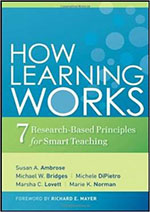 How Learning Works
How Learning Works
Mondays: 2/11, 2/18, 2/25
2:00-4:00 p.m.
This book distills the research on cognition, translating decades of scientific literature into practical advice for university faculty and introducing seven general principles of how people learn. The authors draw on research from cognitive, developmental, and social psychology, as well as educational research, anthropology, etc. The discussion spans issues from memory to motivation, integrating theory with real-classroom examples in practice. Participants will develop strategies for strengthening their own teaching through the application of these principles of cognitive psychology.
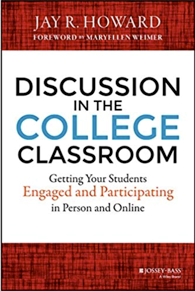 Discussion in the College Classroom\
Discussion in the College Classroom\
Tuesdays: 1/22, 1/29, 2/5
10:00 a.m. – 12:00 p.m.
Whether you have been teaching through class discussion for years, or you’d like to begin incorporating discussion into a course for the first time, this wonderful book is for faculty of all disciplines and experience levels. In Discussion in the College Classroom, Jay R. Howard, a professor of sociology, summarizes findings from an extensive body of research on discussion as a pedagogical technique, and shares practical approaches to keeping classroom discussions fresh, productive, and serving the learning goals, both in person and online. Participants will explore the findings and strategies in the book, and share their own plans for structuring thought-provoking class discussions.
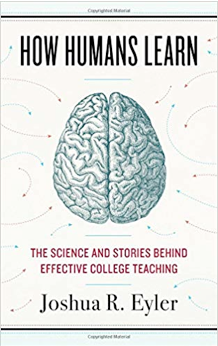 How Humans Learn: The Science and Stories behind Effective College Teaching
How Humans Learn: The Science and Stories behind Effective College Teaching
Wednesdays: 2/20, 2/27, 3/6
2:00-4:00 p.m.
Teaching is a challenging profession. One way to make it easier is to know more about the ways students learn. How Humans Learn surveys research in fields as diverse as developmental psychology, anthropology, and cognitive neuroscience for insight into the science behind learning. Joshua R. Eyler guides the reader through a story that ranges from investigations of the evolutionary record to studies of infants discovering the world for the first time, and from a look into how our brains respond to fear to a reckoning with the importance of gestures and language. In this reading group, we will explore five broad themes—curiosity, sociality, emotion, authenticity, and failure—and discuss practical takeaways for busy teachers.
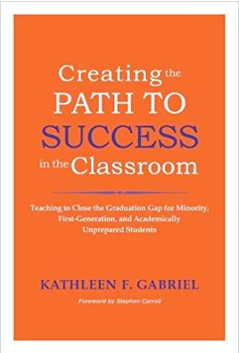 Creating the Path to Success in the Classroom: Teaching to Close the Graduation Gap for Minority, First-Generation, and Academically Unprepared Students
Creating the Path to Success in the Classroom: Teaching to Close the Graduation Gap for Minority, First-Generation, and Academically Unprepared Students
Dates TBD by Doodle Poll
Over the past few decades, extensive research has shown that we can significantly reduce achievement gaps and enhance student learning by adjusting our teaching practices and the ways we structure our courses. But where do we start? Kathleen Gabriel’s book provides practical strategies for building our courses to ensure that more students learn more and more deeply. Gabriel offers concrete steps we can take to enhance student motivation, structure class time effectively, prompt critical thinking, design effective assignments, and create classroom climates that promote learning.
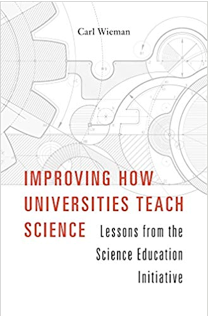 Improving How Universities Teach Science: Lessons from the Science Education Initiative
Improving How Universities Teach Science: Lessons from the Science Education Initiative
Registration closed
Nobel-winning physicist Carl Wieman is also an outspoken proponent of education research, and has spent decades studying the effects of scholarly approaches to teaching. His most recent book presents the results of an extensive science education initiative, and advocates substantial changes in the structure and strategies of college classes, to achieve far greater student learning. He also provides concrete strategies for improving teaching without imposing undue demands on faculty time.
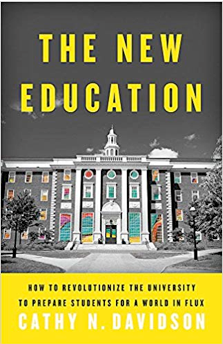 The New Education: How to Revolutionize the University to Prepare Students for a World In Flux
The New Education: How to Revolutionize the University to Prepare Students for a World In Flux
Dates TBD by Doodle Poll
Davidson argues that our current educational system was designed for an industrializing economy, and no longer offers students the type of preparation they require for a globalized and digital future. If universities are to remain relevant in our rapidly changing world, we’ll have to become more nimble. Davidson studies innovative faculty and institutions that have found ways to help students hone their creative, collaborative, and adaptive skills.
This reading/working group is designed especially for women who are interested in leadership positions in higher education, and is co-sponsored by the ACE Women’s Network of Florida, FSU Chapter.



